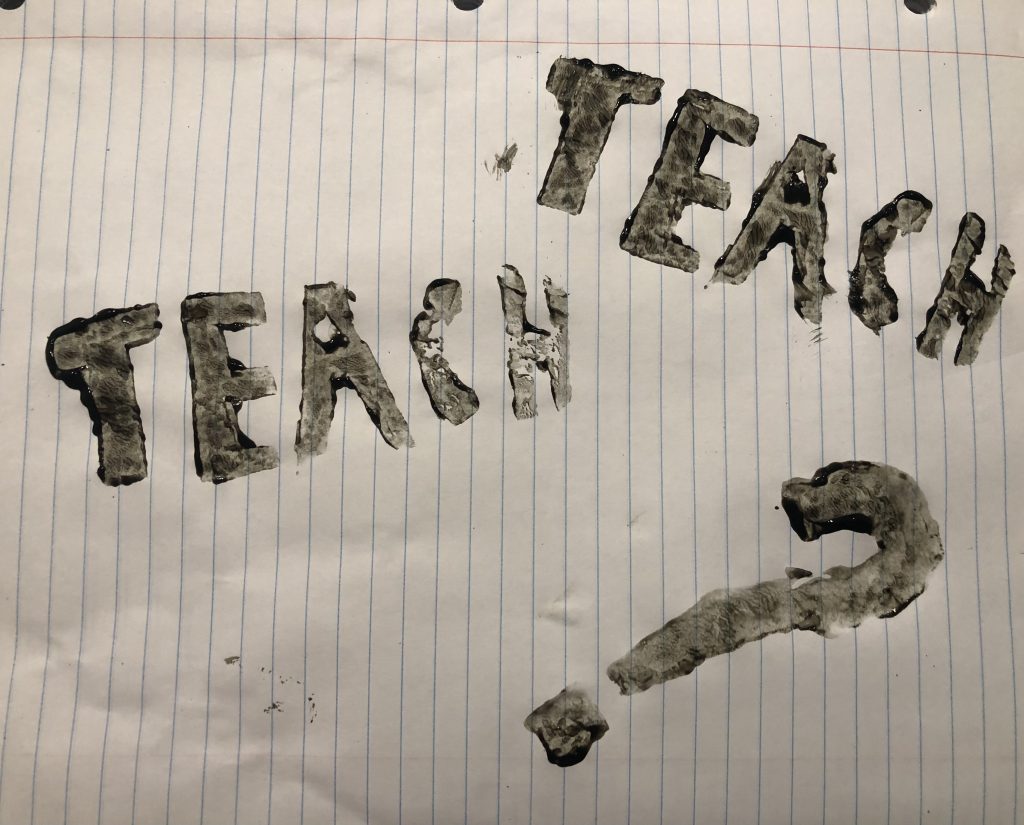
I chose the word teach. Without the right tools this was definitely a challenging process. It took some time, the potato was wet and I could not easily draw on the potato; I had to carve almost freehandly. A more accurate knife and perhaps larger potatoes would have allowed the process to be easier. It took about an hour to create the stamp from start to finish. I imagine that if I had more experience the quicker the process would have been. I noticed I used only capital letters. This was not intentional. Additionally, I did not carve the words backwards, I realized only after I stamped did I require a mirror image (blame the early morning and lack of coffee). I was able to flip my word thanks to my phone’s editing features. I made little connection to potato stamping and the mechanization of writing. It seemed more like a craft or some experiment, however, after watching the Danny Cooke Freelance Filmmaker (2012) video on the letterpress I am blown away by how far we’ve come. The precision, planning, time and care it took to create through the letterpress and texts prior to that is incredible.
The podcast from Lamb (2020) allowed for me to gain a deeper appreciation of the tools we use for writing. Lamb (2020) described the challenges faced in the creation and implementation of written text. Lamb (2020) described how precious books were and how only the elite had access (or even the ability to access) to texts. Through the invention of the printing press more people had access to written works, thus evolving into the education of the masses so all could read (Lamb, 2020). This had me thinking of accessibility.
The school I currently teach at is in a low income neighborhood. When I ask my students; what is your favourite book and do you have books in your home? Many often do not have a favourite and share that the books they have at home are very limited. Many of our students are below the provincial required reading standards and struggle with both literacy and numeracy. Flood (2018) suggests “Growing up in a home packed with books has a large effect on literacy in later life – but a home library needs to contain at least 80 books to be effective, according to new research”. Books are expensive, a library often requires a car, accessible books are not always within reach.
Lamb (2020) reminded us of the eliteness of books hundreds of years ago. Often books were written by hand and incredibly expensive. As books became more accessible more people could read. Today, we have a plethora of online texts. Communicating digitally might even be considered today’s main form of communication as we read much of our text via computer or phones. Flood (2018) “raised the possibility that the move towards a digital culture could reduce the impact of printed books (in the home)”. However, O’Brian (2017) describes that there is a lack of accessibility in today’s digital texts and best practices for accessibility are not often utilized. Even though we have possess the tools to access various digital forms of text they are often not accessible for us to read, furthermore, Flood (2018) suggests that “for now … the beneficial effects of home libraries in adolescence are large and hold in many different societies with no sign of diminution over time”.
Accessibility continues to be an issue when it comes to texts, both digital and traditional. Through further research, the required readings and my potato carving, I have a much better appreciation for the modernization of writing. We’ve come a long way, and we still have a long way to go in making all texts accessible.
References
Danny Cooke Freelance Filmmaker. (2012, January 26). Upside down, left to right: A letterpress film . YouTube.
Flood, A. (2018, October 10). Growing up in a house full of books is major boost to literacy and numeracy, study finds. The Guardian. https://www.theguardian.com/books/2018/oct/10/growing-up-in-a-house-full-of-books-is-major-boost-to-literacy-and-numeracy-study-finds
O’Brian, A (2017, December 11). Making digital communications accessible. Edutopia. https://www.edutopia.org/article/making-digital-communications-accessible
Lamb, R., & McCormick, J. (Hosts). (2020, May 26). From the vault: Invention of the book, part 1 . In Stuff to blow your mind. iHeart Radio.
Lamb, R., & McCormick, J. (Hosts). (2020, May 28). From the vault: Invention of the book, part 2 . In Stuff to blow your mind. iHeart Radio.